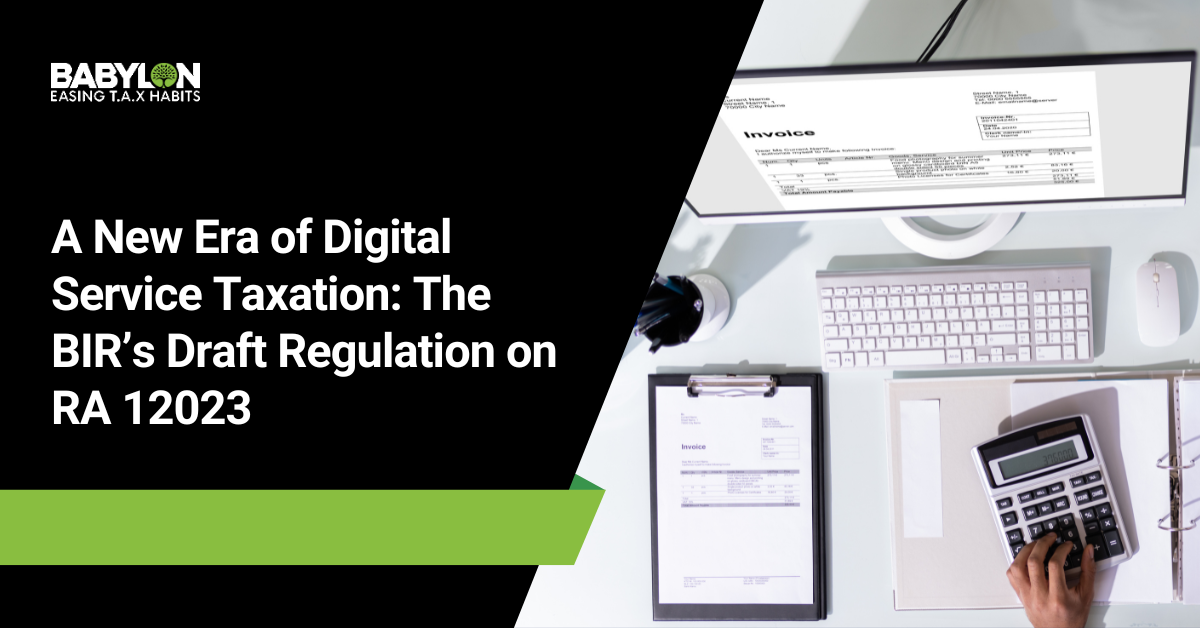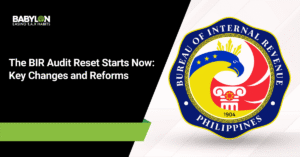The Evolution of Taxation in the Digital Economy
As the world increasingly shifts to the digital age, the Philippines has found itself grappling with how to keep its tax system in step with this rapid transformation. The explosion of online services—streaming platforms, e-commerce, digital advertising, and cloud storage—has created a new economy, one that does not rely on traditional physical infrastructures but operates seamlessly across borders. However, despite their ubiquity, these digital services have largely escaped the reach of the country’s taxation framework.
In response, the Philippine government, under the leadership of the Bureau of Internal Revenue (BIR), is taking bold steps to ensure that the growing digital economy contributes fairly to the nation’s revenue streams. A significant milestone in this effort is the draft regulation issued by the BIR, which implements a Value-Added Tax (VAT) on digital services. This regulation aims to bring all digital services—whether consumed by individuals or businesses—under the VAT framework, ensuring that services offered by both local and foreign digital service providers (DSPs) are taxed in the same way.
The regulation is a direct complement to Republic Act No. 12023, which amended the National Internal Revenue Code (NIRC), and it addresses the ever-growing gap between traditional and digital sectors. In the past, DSPs that operated solely online, without any physical presence in the Philippines, often went untaxed, a loophole that the new regulation seeks to close.
The regulation’s scope is broad. It applies to a wide array of internet-based services, from online streaming platforms and search engines to cloud-based applications and digital advertising. In effect, the government is ensuring that as the world moves towards a more digital future, it doesn’t leave behind the financial contributions of the companies that power this new economy. To make this possible, the BIR is now equipped with the authority to issue closure or take-down orders against non-compliant DSPs, halting their operations in the country if they fail to register and comply.
Fairness, Accountability, and Growth in the Digital Economy
The key message of this regulation is simple but crucial*: the digital economy will no longer operate in a tax-free zone.Whether a company has a physical presence in the Philippines or not, if it provides digital services to Filipino consumers, it will be subject to the same tax laws as traditional businesses. This ensures that the growing digital economy—one that has revolutionized the way Filipinos consume entertainment, shop, and do business—is contributing to the nation’s economic development in a fair and accountable manner.
The BIR’s draft regulation grants the tax authority the power to issue orders that can directly halt the operations of non-compliant DSPs, leveling the playing field between local and international companies. In partnership with the Department of Information and Communications Technology (DICT) and the National Telecommunications Commission (NTC), the BIR has taken a significant step toward closing the loopholes in the digital economy. With these powers, the regulation can effectively track and ensure that digital service providers operating in the Philippines follow the tax rules—whether they are based locally or internationally.
This regulation brings clarity and consistency, allowing DSPs to understand their obligations and responsibilities. Nonresident DSPs will now have to register with the BIR and may even be required to appoint a local representative, ensuring that there is accountability even for digital businesses that do not have a physical presence in the country. Local businesses, on the other hand, will be tasked with withholding and remitting VAT on digital services they acquire from DSPs, ensuring that tax collection happens seamlessly.
Ensuring Fair Competition and Contributing to Nation Building
The implementation of this VAT on digital services promises tangible benefits for both the Philippine government and its people. One of the primary gains is the expected increase in government revenue. As the consumption of digital services continues to rise, the Philippines stands to gain a substantial amount of tax revenue, which can be used to fund vital public infrastructure projects, enhance social services, and support the nation’s economic recovery post-pandemic.
The regulation will also ensure that DSPs, whether local or foreign, are held to the same standards, promoting fairness and transparency in the digital marketplace. Filipino consumers and businesses will no longer face the unequal situation where some services escape the taxation system while others are heavily taxed. This levels the playing field, fostering an environment where both local and international players are subject to the same rules and obligations.
In particular, the regulation offers clarity to DSPs on their responsibilities, thus promoting voluntary compliance and reducing the risk of tax evasion. DSPs that comply with the new rules will benefit from a more predictable and stable tax environment, while non-compliant entities will face clear penalties, including the possibility of having their services shut down.
For Filipino businesses, this regulation will mean greater tax transparency and fairness in B2B transactions. Local companies will no longer be disadvantaged by DSPs that avoid taxes, and the VAT withholding mechanism will ensure that taxes are collected directly at the point of transaction. As a result, Filipino businesses can operate in an environment where all players, whether local or foreign, are contributing fairly to the country’s tax base.
Lastly, by exempting educational services from VAT, the regulation provides a critical boost to the nation’s educational sector. Services offered by accredited institutions, as well as those provided to government educational agencies like DepEd and TESDA, will remain VAT-exempt, ensuring that educational platforms remain affordable and accessible to all Filipinos.
In conclusion, the BIR’s draft regulation on VAT for digital services marks a pivotal moment in the Philippines’ evolution toward a fully integrated digital economy. By bringing digital service providers into the tax fold, this regulation not only secures a fair and competitive marketplace but also strengthens the country’s revenue base, ensuring that the Philippines continues to grow and thrive in an increasingly digital world.
Let us Guide you Through these Changes!
Babylon2k helps these businesses adapt to these new laws, making you compliant and prepared to handle the complications of VAT reporting, tax filing, and adapting to new regulations. Utilizing our expertise in accounting and tax ensures that your business remains compliant while minimizing disruption to your operations.
Whether you’re a small business, a growing startup, or a company reliant on digital platforms, Babylon2k provides tailored solutions to meet your business’s needs. Each service is designed to simplify the tax process for you. Each service has a corresponding code (e.g., 110010, 110040), and the following services under tax are:
✍️ GG0140 – TAX COMPLIANCE REVIEW
✍️ GG0150 – TAX ADVISORY SERVICES
✍️ GG0160 – TAX PLANNING
Additionally, Babylon2k’s B.E.T.H. can help you when you need more information and clarification on how this law affects your business. Avail of the early bird discount—until October 31, 2024, only!
> Sign up to better understand new tax compliance issuances
Let us guide you through these changes! When you’re ready to start, simply sign in or request a quote and enter the relevant service code(s) to ensure we can connect you with the perfect Babylon2k specialist.
- Request a free consultation > Learn more
- Message us on Viber/Whatsapp Number @ +63-927-945-3382.
- Email us directly at [email protected]
SOURCE
⚖️ https://bir-cdn.bir.gov.ph/BIR/pdf/VAT on DSP_public_consultation (1).pdf






